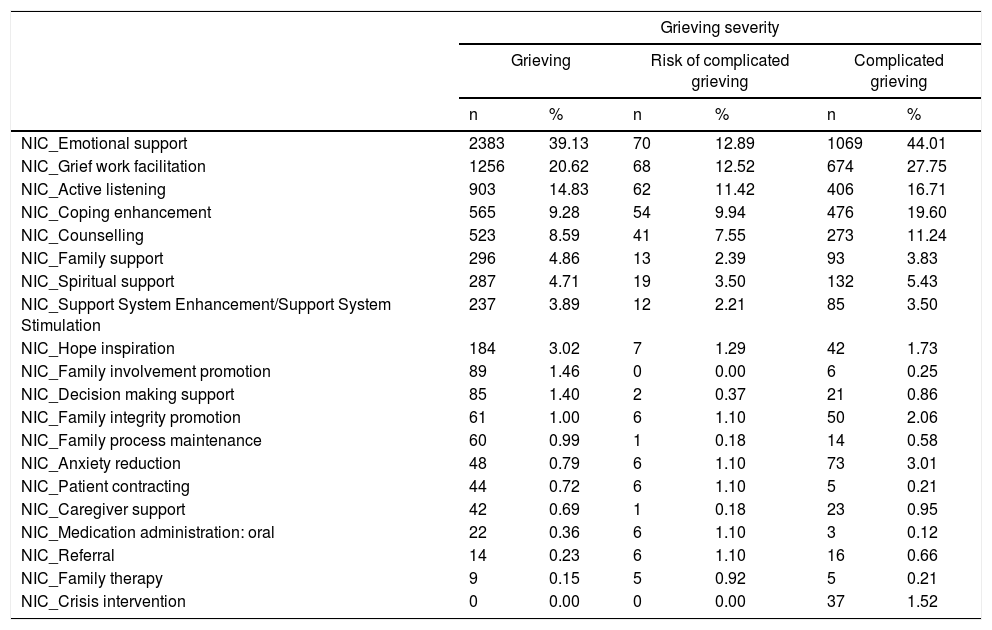Nursing care in bereavement is complex. Primary health care is the ideal setting to support the bereaved, but we do not know much about the care plans designed by primary health care nurses in the treatment of grief.
ObjectiveTo identify the outcomes criteria and interventions planned by nurses for mourners with and without complications in the Canary Islands.
MethodRetrospective longitudinal study, using the electronic health records of the Canary Islands health service of people with a diagnosis of grieving, risk of complicated grieving and complicated grieving, in the period 2009–2014.
ResultsNOC outcomes criteria were recorded in 67% of the mourners, and up to 24 different outcomes were identified. The main outcomes measures were Grief resolution; Psychosocial adjustment, Life change; Coping; Family coping; Family social climate and Caregiver emotional health. The remaining outcomes were present in less than 1% of the mourners. Although the outcomes criteria proposed by nurses in the mourners with and without complications were quite homogeneous, differences in interventions were found. In 67% of the cases, NIC interventions were reported. Ninety-nine different interventions were identified in the mourners; the most frequent were Emotional support; Grief work facilitation; Active listening; Coping enhancement and counselling. The remaining identified interventions were present in less than 5% of patients. The main interventions in the mourners with complications were Grief work facilitation; Coping enhancement; Active listening; Counselling and Family integrity promotion.
ConclusionNurses state that there are more interventions and outcomes in mourners with complications. Given the few methodologically reliable studies that prove their effectiveness, continued research in this area is recommended.
La atención de enfermería ante un caso de duelo es compleja. En el tratamiento del duelo, poco se sabe sobre el plan de cuidados planificado por las enfermeras de Atención Primaria.
ObjetivoConocer los criterios de resultado e intervenciones planificadas por las enfermeras para los dolientes con y sin complicaciones en la comunidad autónoma de Canarias.
MétodoEstudio retrospectivo transversal, realizado con los registros de la historia clínica informatizada de Atención Primaria del Servicio Canario de la Salud en aquellos pacientes diagnosticados de duelo, riesgo de duelo complicado y duelo complicado en el periodo 2009-2014.
ResultadosSe registran criterios de resultado NOC en el 67% de los dolientes, identificando hasta 24 diferentes. Los principales en la atención del doliente con complicaciones son: Resolución de la aflicción; Modificación psicosocial, cambio de vida; Afrontamiento de problemas; Afrontamiento de los problemas de la familia; Clima social de la familia y Salud emocional del cuidador principal. El resto está presente en menos del 1% de los dolientes. Pese a que los criterios de resultado que proponen las enfermeras en los dolientes con y sin complicaciones son bastante homogéneos, se encuentran diferencias en las intervenciones. Se registran intervenciones NIC en el 67%. Se identifican 99 intervenciones diferentes en los dolientes, siendo las más frecuentes en aquellos en los que registró alguna intervención: Apoyo emocional; Facilitar el duelo; Escucha activa; Aumentar el afrontamiento y Asesoramiento. El resto de intervenciones identificadas está presente en menos del 5% de los pacientes. Se realizan más en los dolientes con complicaciones: Facilitar el duelo; Aumentar el afrontamiento; Escucha activa; Asesoramiento y Estimulación de la integridad familiar.
ConclusiónLos registros enfermeros demuestran que hay más intervenciones y resultados planificados en dolientes con complicaciones. Dados los pocos estudios metodológicamente confiables que prueban su efectividad, se recomienda continuar la investigación en esta área.









